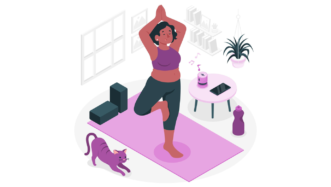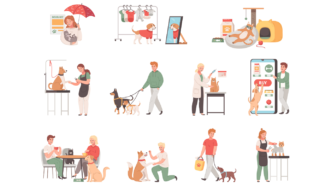LESSON OVERVIEW
In this lesson about habits, students revise three used to structures and learn phrases with the word habit. They also watch a video about neuroplasticity and reflect on different aspects of some common habits developed by people.
This is a Flipped Classroom lesson plan. In a nutshell, it means that the first part of the lesson needs to be done by students at home. Learn more about flipped classroom and how we implement it in these lesson plans in our post.
PRE-CLASS ACTIVITIES
Used to structures & phrases with habit
Before the lesson, students on their own read six unfinished sentences and have to match them with their endings. This task allows them to check what they remember about three common used to structures (used to, be used to, get used to). Students complete a table choosing the correct information about the meaning and form of each of them. Then, they put the rules into practice and have to rewrite six given sentences choosing the correct used to structure. Next, they move on to a vocabulary part. They have to analyse five phrases with the word habit and decide whether they describe getting into/being in the habit or stopping the habit. Once their meanings are clear, students move on to the next task and use the phrases to complete five gapped sentences.
IN-CLASS ACTIVITIES
Listening & speaking practice
The in-class part of this lesson about habits starts with a discussion in which students talk about their own routines and practise the language they learnt on their own. Before watching a video, they read a statement about the brain and have to decide whether it’s true. They watch the video to check their answers and learn what neuroplasticity is. Then, students listen for details, putting nine words and phrases from the video in the order they hear them. The listening practice is followed by a vocabulary task. Students read a short gapped text related to neuroplasticity and have to complete it with the words/phrases from the previous exercise (e.g. pathways, carve out, hard-wired). The lesson finishes with a speaking activity in which students discuss some common habits that people have. They put into practice the words and phrases they learnt earlier and answer five given questions.
WORKSHEETS
Subscribe to unlock these and many other Standalone lesson lesson plans with the Unlimited plan
Subscribe












Great lesson! The grammar section is a bit confusing because of the Italics, I’d suggest going over it before in order to explain it to the student, but all in all great. Practical and interesting! Thank you!
Christiane, thank you so much for your feedback! We took another look at the grammar section and added ‘bold’ to the phrases students need to choose so that it’s clearer. I hope it works better now!
Wow, what a coincidence! Just a few days ago was thinking myself to create a lesson based on the topic of neuroplasticity and BAM, there it is 🙂 Good thing that you’ve integrated “used to” grammar, and I just can’t wait to try this lesson with my students! Thank you, Olia, I always find your lessons extremely engaging and relevant!
Alisa, I’m happy to know that you find this lesson interesting and useful. I hope your students enjoy it too!
Very nice, thank you. I’ve found the video pretty boring though. I’ll be using this one: https://www.youtube.com/watch?v=wr6fQ4KpbRM (Why is it so hard to break a bad habit? TedEd). Anyway, thank you again and wish you the best
Thanks for your feedback and for sharing the video! It’s great and I hope it works well with the rest of the lesson 🙂
This is one of those lessons that my students remember long after I have taught it. The neuroplasticity video was fascinating for them and they loved the whold concept of the brain being able to make new pathways, so we don’t have to be victims. A BIG thank you!
That’s great! Thanks for your lovely comment 🙂